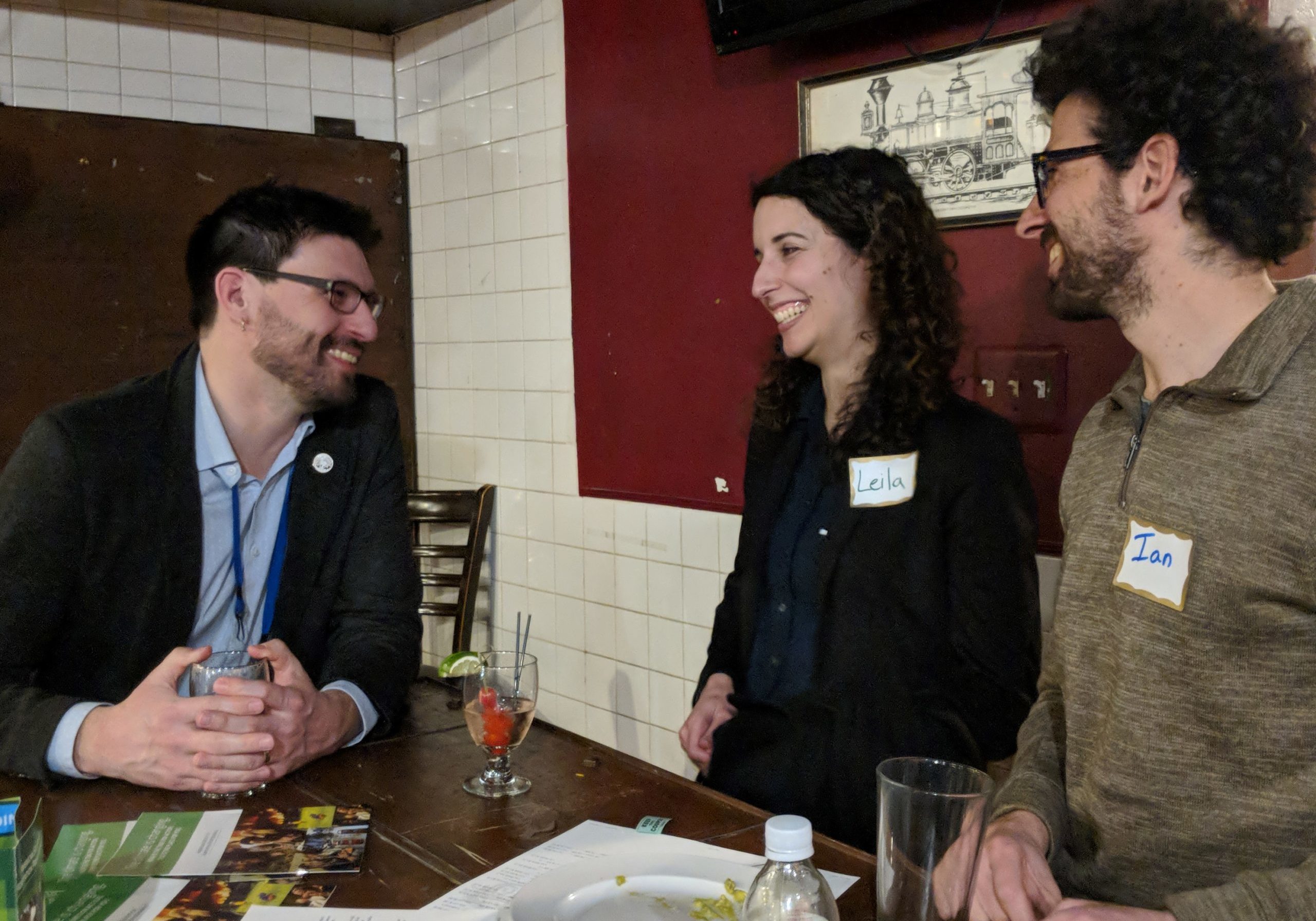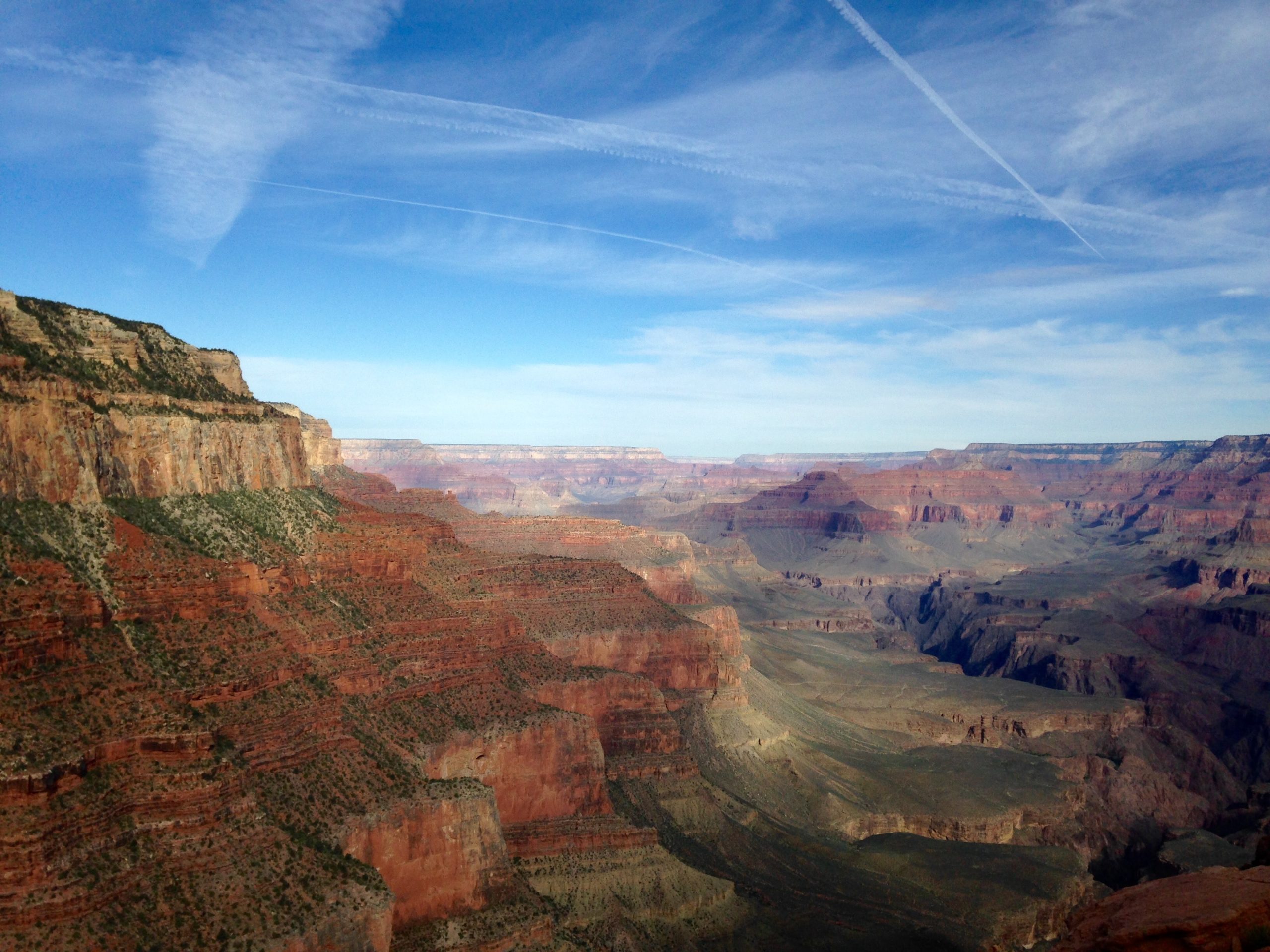Local and Regional Hubs Program
Connect with other ASAP members, grow the ASAP network, and work together to advance the adaptation field from wherever you live and work!
As adaptation professionals, we understand that all adaptation is local: that the climate, politics, geology, culture, history, and economy of a place shape its needs and opportunities. And we know there’s nothing quite like connecting with a colleague who deeply understands the place where you live and work. With this in mind, the ASAP Hubs program builds the capacity of ASAP members to connect and advance adaptation work in place -- while strengthening the entire ASAP network -- through three opportunities:
- A living list of adaptation networks, collaboratives, and other similar groups that increase local and regional connectivity, exposure, and resource-sharing.
- A community events fund that supports informal, local networking events organized by ASAP members.
- Microgrants that support members’ collaborative, place-based projects.
Living List of Local and Regional Adaptation Networks
Tap into the robust ecosystem of climate adaptation and resilience networks, collaboratives, and other similar groups to find the support you need close to home.
- Alaska Center for Climate Assessment and Policy (ACCAP) Tina Buxbaum; tmbuxbaum@alaska.edu
- NOAA Regional Climate Services Directors, Ellen Mecray, Ellen.L.Mecray@noaa.gov
- NOAA Regional Climate Centers, Ellen Mecray, Ellen.L.Mecray@noaa.gov
- Alaska CASC Center Director, Stephen Gray, Ph.D. sgray@usgs.gov
- BC Professionals Adaptation Network Beverly deVries; climateaction@royalroads.ca
- Bay Area Climate Adaptation Network Michael McCormick; michael@baycanadapt.org
- Capital Region Climate Readiness Collaborative Julia Kim; jkim@lgc.org
- Central Coast Climate Collaborative centralcoastclimate@gmail.com
- Los Angeles Regional Collaborative for Climate Action and Sustainability (LARC) Erin Coutts; ecoutts@ucla.edu
- North Coast Resource Partnership (NCRP) Katherine Gledhill; kgledhill@westcoastwatershed.com
- San Diego Regional Climate Collaborative (SDRCC) Christiana DeBenedict; cdebenedict@sandiego.edu
- Sierra Climate Adaptation & Mitigation Partnership (Sierra CAMP) sierracamp@sierrabusiness.org
- Southwest Climate Adaptation Science Center (SW CASC), Acting Director, Carolyn Enquist, cenquist@usgs.gov
- Women's Alliance for Climate Justice Hannah Doress, Kendall Stark; hannah@wordoutconsulting.com
- ARCCA Julia Kim; jkim@lgc.org
- California-Nevada Climate Applications Program (CNAP) shorestation@ucsd.edu
- NOAA Regional Climate Services Directors, Ellen Mecray, Ellen.L.Mecray@noaa.gov
- NOAA Regional Climate Centers, Ellen Mecray, Ellen.L.Mecray@noaa.gov
- NOAA Regional Climate Services Directors, Ellen Mecray, Ellen.L.Mecray@noaa.gov
- NOAA Regional Climate Centers, Ellen Mecray, Ellen.L.Mecray@noaa.gov
- Metro Kansas City Climate Action Lindsey Constance, Mike Kelly; lindsey4shawnee@gmail.com, mkelly@roelandpark.org
- South Central Climate Adaptation Science Center (South Central CASC), Acting Director, Michael Langston, mlangston@usgs.gov
- NOAA Regional Climate Services Directors, Ellen Mecray, Ellen.L.Mecray@noaa.gov
- NOAA Regional Climate Centers, Ellen Mecray, Ellen.L.Mecray@noaa.gov
- Pacific RISA Wendy Miles; milesw@eastwestcenter.org
- NOAA Regional Climate Services Directors, Ellen Mecray, Ellen.L.Mecray@noaa.gov
- NOAA Regional Climate Centers, Ellen Mecray, Ellen.L.Mecray@noaa.gov
- Pacific Islands Climate Adaptation Science Center (PI CASC), Director, Mari-Vaughn Johnson, mvjohnson@usgs.gov
- Western Water Assessment (WWA) Lisa Dilling; ldilling@colorado.edu
- Intermountain Adaptation Partnership Dave Peterson, Jessica Halofsky; wild@uw.edu, jhalo@uw.edu, nlittle@fs.fed.us
- NOAA Regional Climate Services Directors, Ellen Mecray, Ellen.L.Mecray@noaa.gov
- NOAA Regional Climate Centers, Ellen Mecray, Ellen.L.Mecray@noaa.gov
- North Central Climate Adaptation Science Center (NC CASC), Director, Nicole Decrappeo, ndecrappeo@usgs.gov
- Southwest Climate Adaptation Science Center (SW CASC), Sarah LeRoy, sary21@arizona.edu
- Mid-Atlantic Regional Integrated Sciences and Assessments (MARISA) Krista Romita Grocholski; Krista_Romita_Grocholski@rand.org
- NJ Climate Adaptation Alliance Jeanne Herb, Marjorie Kaplan; jherb@ejb.rutgers.edu, kaplan@envsci.rutgers.edu
- Resilient and Sustainable Communities League Kate Hutelmyer; khutelmyer@delawareestuary.org
- Eastern Shore Land Conservancy Jim Bass; jbass@eslc.org
- NOAA Regional Climate Services Directors, Ellen Mecray, Ellen.L.Mecray@noaa.gov
- NOAA Regional Climate Centers, Ellen Mecray, Ellen.L.Mecray@noaa.gov
- Mid-Atlantic Federal Climate Partners, Ellen Mecray, Ellen.L.Mecray@noaa.gov
- Great Lakes Integrated Sciences and Assessment (GLISA) Jenna Jorns, GLISA Program Manager; GLISA-info@umich.edu, jljorns@umich.edu
- Michigan Climate Coalition (Michigan) Chris Hoving; mayaef@msu.edu
- Great Lakes Climate Adaptation Network (Great Lakes + Ontario) Matt Naud; matt@adapt.city
- Minnesota Climate Adaptation Partnership Joel Larson; jplarson@umn.edu
- Greenest Region Compact Edith Makra; emakra@mayorscaucus.org
- Indiana University Environmental Resilience Institute Andrea Webster; webster5@iu.edu
- NOAA Regional Climate Services Directors, Ellen Mecray, Ellen.L.Mecray@noaa.gov
- NOAA Regional Climate Centers, Ellen Mecray, Ellen.L.Mecray@noaa.gov
- Acting Director, Midwest CASC, Olivia LeDee, Ph.D. oledee@usgs.gov
- Wisconsin Initiative on Climate Change Impacts, Dominic Holt, Dominic.Holt@wisconsin.gov
- Coastal States Organization (Network of state coastal zone programs (CZM), Vidya Balasubramanya, vbalasubramanyam@
coastalstates.org - Network for Landscape Conservation (Center for Large Landscape Conservation), Kat Lyons, kat@largelandscapes.org
- Mass ECAN (Ecosystem Climate Adaptation Network) Melissa Ocana; massecan@umass.edu
- Consortium on Climate Risk in the Urban Northeast (CCRUN) Daniel Bader; info@ccrun.org, dab2145@columbia.edu
- Upper Valley Adaptation Workgroup Ana Mejia; ana@vitalcommunities.org
- NH Coastal Adaptation Workgroup Sherry Godlewski, Abigail Lyon; sherry.godlewski@des.nh.gov, Abigail.Lyon@unh.edu
- Storm Surge William Clary; stormsurge9@gmail.com
- Massachusetts Climate Adaptation Coalition Steve Long; slong@tnc.org
- Metro Mayors Coalition Lizzi Weyant, Rachel Marx; eweyant@mapc.org, RMarx@mapc.org
- Maine Ag & Climate Network Sue Erich; erich@maine.edu
- The Infrastructure and Climate Network (ICNet) Steven Miller; steven.j.miller@state.ma.us
- NOAA Regional Climate Services Directors, Ellen Mecray, Ellen.L.Mecray@noaa.gov
- NOAA Regional Climate Centers, Ellen Mecray, Ellen.L.Mecray@noaa.gov
- New England Federal Partners, Ellen Mecray, Ellen.L.Mecray@noaa.gov
- Northeast CASC Center Director, Katherine Smith, Ph.D. katherinesmith@usgs.gov
- Northwest CASC Center Director, Nicole M DeCrappeo, Ph.D. ndecrappeo@usgs.gov
- Climate Impacts Research Consortium (CIRC) Denise Lach; denise.lach@oregonstate.edu
- Washington Interagency Climate Adaptation Network Lynn Helbrecht; Lynn.Helbrecht@dfw.wa.gov
- King County-Cities Climate Collaboration Matt Kuharic
- Puget Sound Climate Preparedness Collaborative Russel Paez; contact@pugetsoundclimate.org
- NOAA Regional Climate Services Directors, Ellen Mecray, Ellen.L.Mecray@noaa.gov
- NOAA Regional Climate Centers, Ellen Mecray, Ellen.L.Mecray@noaa.gov
- Forest Adaptation Network, Northwest Natural Resource Group, Rowan Braybrook rowan@nnrg.org
- One Bay Working Group CJ Reynolds; cjreynolds@tbrpc.org
- Carolinas Integrated Sciences and Assessments (CISA) Amanda Farris; cisa@sc.edu, afarris@sc.edu
- Southern Climate Impacts Planning Program (SCIPP) Caylah Cruickshank; caylahc@ou.edu
- Charleston Resilience Network Dan Burger; dan.burger@gmail.com
- Gulf of Mexico Alliance Coastal Resilience Team Gareth Leonard; Gareth.Leonard@myfwc.com
- Climate and Resilience Community of Practice Tracie Sempier; tracie.sempier@usm.edu
- Georgia Climate Project georgiaclimateproject@emory.edu
- Triangle Regional Resiliency Partnership (TRRP) Jen Schmitz; jschmitz@tjcog.org
- Northeast Florida Regional Council (NEFRC) Margo Moehring; mmoehring@nefrc.org
- East Central Florida Regional Planning Council (ECFRPC) Jennifer Rupert; jrupert@ecfrpc.org
- Southeast Florida Regional Climate Change Compact Lauren Ordway (ISC); lordway@sustain.org
- North Carolina Coastal Resilience Community of Practice Samantha Burdick; samantha.burdick@ncdenr.gov
- The Collider Megan Odom; megan@thecollider.org
- NOAA Regional Climate Services Directors, Ellen Mecray, Ellen.L.Mecray@noaa.gov
- NOAA Regional Climate Centers, Ellen Mecray, Ellen.L.Mecray@noaa.gov
- Southeast CASC Center Director, Katherine Smith, Ph.D. katherinesmith@usgs.gov
- Climate Assessment for the Southwest (CLIMAS) Ben McMahan; bmcmahan@email.arizona.edu
- Southwest Practitioners Adaptation Network (SPAN) Amanda Leinberger; aleinberger@arizona.edu
- NOAA Regional Climate Services Directors, Ellen Mecray, Ellen.L.Mecray@noaa.gov
- NOAA Regional Climate Centers, Ellen Mecray, Ellen.L.Mecray@noaa.gov
- Southwest Climate Adaptation Science Center (SW CASC), Acting Director, Carolyn Enquist, cenquist@usgs.gov
Are you part of a local or regional adaptation network, collaborative, or group that’s not yet listed here?
Submit it for inclusion by filling out this form.
ASAP Community Events Fund
The ASAP Community Events Fund is a pool of funds for informal networking events organized by ASAP members that serve adaptation professionals in a particular location. Any ASAP member may request funding for up to 3 events per year in a given area, totaling up to $200 for the year. To request funding, email ASAP at info@adaptpros.org. Include your name, email address, phone number, event location, and a short (200 word) event description. Please note: In-person events must comply with CDC guidelines and local covid-19 regulations. Availability of Community Events Fund money is dependent on ASAP's current budget position at the time of the request and may change throughout the year.

Microgrants
ASAP’s Place-Based Microgrants provided up to $3,000 to catalyze members’ collaborative adaptation projects and stimulate grassroots involvement in the ASAP network. Projects were designed to:
2020-2021 Local and Regional Hubs Microgrant Projects
ASAP supported three projects to catalyze members’ collaborative, place-based climate change adaptation work and stimulate grassroots involvement in the ASAP network. Future microgrant opportunities will be posted here, stay tuned!

Asheville Climate Equity Dialogue
Geoffrey Habron, Ph.D, Department of Earth, Environmental, and Sustainability Sciences, Furman University.
ASAP members in Asheville developed opportunities to engage local residents in a climate equity dialogue to enhance Asheville's Climate Resilience Assessment Plan.
Project Team: Geoffrey Habron (Furman University), Jennifer Runkle (NC State, NOAA National Centers for Environmental Information), Jim Fox and Aashka Patel (NEMAC + FernLeaf), Ned Gardiner (NOAA Climate Program Office), Megan Odom (The Collider).
Baldwin Hills Conservancy Resilience Hub - Los Angeles
Woodrow Covington, Grants & Proposals Manager, Climate Resolve
Climate Resolve and SLATE-Z produced a detailed study on a resilience hub for the Baldwin Hills Conservancy in LA. The study examines community risks and suggests actionable solutions, analyzes resilience hub best practices, and covers topics such as independent energy sources, water supply, and information dissemination.
Project Team: Natalie Hernandez, Jonathan Parfrey, Woodrow Covington, Chase Engelhardt, Seth Jacobson, Thelma Briseno, Mariana Estrada, Gabriel Varela (Climate Resolve).


Southwest Practitioners Adaptation Network
Amanda Leinberger, Southwest Practitioners Adaptation Network, University of Arizona
ASAP members in the Southwest developed a network visualization tool and website for the Southwest Practitioners Adaptation Network (SPAN). The website increases member connectivity and allows for better access to resources, expertise, and events. Improving this critical network infrastructure catalyzes SPAN’s member engagement across the Southwest and enhances connections to the ASAP network regionally and nationally.
Project Team: Kathy Jacobs and Amanda Leinberger (Center for Adaptation Science and Solutions), Carolyn Enquist (SW Climate Adaptation Science Center), Ladd Keith (U. Arizona Extreme Heat Network), Emile Elias (USDA Southwest Climate Hub), Benét Duncan (Western Water Assessment).
Thank you to our Hubs Microgrant Selection Committee members!

